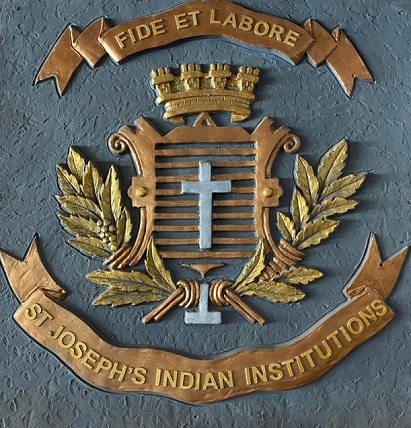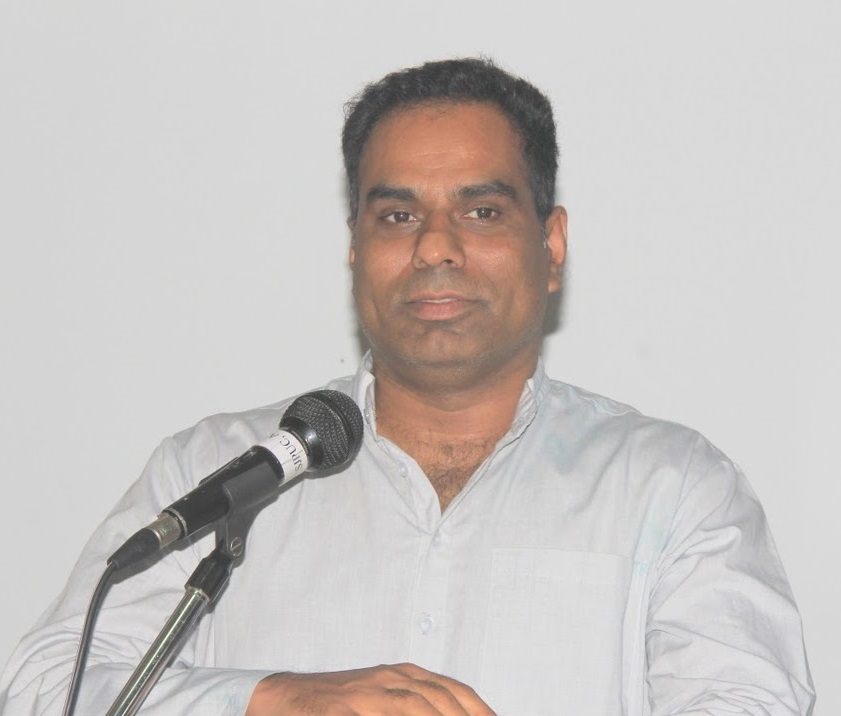
Our Humble Beginnings

So it regards every element of creation as worthy of study and contemplation, capable of endless exploration
In 1841, Bishop Bonnaud had a dream of starting an educational institution at St. John’s Hill. The French priests of the Paris Mission (MEP) made this dream a reality and named the school as St. Joseph’s School. But in 1937, all the institutions managed by MEP Fathers in Bangalore – the European was High School and boarding house, the Indian High School and St. Louis Boarding House and St. Joseph’s College along with the extensive playgrounds at Lal Bagh Road and M.G.
In 1972, the St. Joseph’s Indian High School together with the St. Louis Boarding House shifted to the current location. Rev. Fr. Charles Andrade, S. J., was instrumental in the extension and the completion of the new High School building, the residence of the Jesuit Fathers and Brothers and the St. Louis Boarding House.
Soon, great encouragement was given to the field of sports during the time of Fr. Sunith Prabhu, S.J. It then that the school was adopted by The Sports Authority of India (SAI) and was the first school in Karnataka State to enjoy the benefits offered by the SAI. The Swimming Pool and the Gymnasium were built at this time. Coaches from the SAI have been training our students since then.
The School completed its glorious hundred years during the academic year 2003-2004. The Centenary celebration was not a moment for the management and the staff to rest. It was during the Centenary Celebrations that yet another great dream was placed before the students, the parents and the alumni – a new building to house the High School and the PU College. Thanks to the effort of Fr. Melwin Pinto, S.J., the support of so many benefactors like Mrs. Vijayalakshmi Ekanandan and the parents of the students at the school then, the new building was inaugurated on 4th December 2006.
In 2007 came yet another development on the campus – the appearance of the St. Joseph’s Indian Community College with Fr. Francis Guntipilly, S.J. as its Director. This College conducts courses for the rural unemployed youth and helps them to get employment. This institution has been known over the years for the concern it has shown towards its students from the poorer and weaker sections of society.
In the year 2014, the management added a jewel to its crown, with the starting of St. Joseph’s School, CBSE. It institution is catering to about 1800 students.
St. Joseph’s Indian Primary School is the latest addition to the campus, which is a co-educational school. Earlier the school was known as St. Joseph’s Indian Middle School which catered to the education of the boys.
Our Inspiration

St. Joseph, who is the foster father of Jesus Christ, was a carpenter by profession and a symbol of hard work and toil. The vision of Jesuit Education is inspired by the life and teachings of Jesus Christ. It is a vision that is committed to the quest for a deep understanding of the myriad facets of reality. Joseph, the silent man of the Gospels, is in the line of the great men of faith of the Old Testament. He is described as a "just man", a righteous man of integrity.
St. Joseph was a descendant of King David. The Gospels describe Joseph as a "tekton" traditionally the word has been taken to mean "carpenter", though the Greek term evokes an artisan with wood in general, or an artisan in iron or stone. He was declared to be the patron saint and protector of the Catholic Church by Pope Pius IX in 1870.
The Institution has taken St. Joseph to be our Patron for he was faithful to his responsibility as the husband of Mary and the foster father of Jesus. He was a dreamer who understood the plan of God in his dreams and a symbol of hard work and simplicity. The Motto - 'Fide Et Labore' reflects the spirit of St. Joseph.
Prayer
St. Joseph, Renowned offspring of David, Spouse of the Mother of God, chaste guardian of the Virgin, Foster Father of the Son of God, Diligent protector of Christ, Joseph most just and Joseph most faithful.
Pray for us
Jesuit School

The Fathers of the Society of Jesus (Jesuits) is a religious order of the Catholic Church, founded by St. Ignatius of Loyola in 1540. The Jesuits are active in the field of education throughout the world. In India, they run many schools and colleges. These institutions are part of the Catholic Church’s effort to impart education to the people of India.
1.World-Affirming: Jesuit education acknowledges God as the Author of all reality, all truth and all knowledge. God is present and working in all of creation: in nature, in history and in persons. Jesuit education, therefore, affirms the radical goodness of the world ‘charged with the grandeur of God.’ So it regards every element of creation as worthy of study and contemplation, capable of endless exploration
2.The total formation of each individual within the community: God is especially revealed in the mystery of the human person, ‘created in the image of likeness of God.’ Jesuit education, therefore, probes the meaning of human life and is concerned with the total formation of each student as an individual personally loved by God. The objective of Jesuit education is to assist in
the fullest possible development of all of the God-given talents of each individual person as a member of the human community.In Jesuit education, particular care is given to the development of the imaginative, the affective, and the creative dimensions of each student in all courses of study. These dimensions enrich learning and prevent it from being merely intellectual. For these same reasons, Jesuit education includes opportunities through course work and through co-curricular activities which help all students to come to an appreciation of literature, aesthetics, music and fine arts.
3.Value-oriented Education : Jesuit education includes formation in values, in attitudes, and in an ability to evaluate criteria; that is, it includes formation of the will. Since a knowledge of good and evil, and of the hierarchy of relative goods is necessary both for the recognition of the different influences that affect freedom and for the exercise of freedom, education takes place in a moral context: knowledge is joined to virtue.
4.Men and Women for others : Jesuit education helps students to realize that talents are gifts to be developed, not for self satisfaction or self gain, but rather, with the help of God for the good of the human community. Students are encouraged to use their gifts in the service of others, out of love for God.
5.A particular concern for the poor : Reflecting on the actual situation of today’s world and responding to the call of Christ who had a special love and concern for the poor, the Jesuits have made a ‘preferential option’ for the poor. This includes those without economic means, the handicapped, the dalits, the marginalized and all those who are, in any sense, unable to live a life of full human dignity. In Jesuit education this option is reflected both in the students who are admitted and in the type of formation that is given.
6.Excellence in formation : In Jesuit education, the criteria of excellence is applied to all areas of student life: the aim is the fullest possible development of every dimension of the person, linked to the development of a sense of values and a commitment to the service of others which gives priority to the needs of the poor and is willing to sacrifice self-interest for the promotion of justice. The pursuit of academic excellence is appropriate in a Jesuit Institution, but only within the larger context of human excellence.
A traditional aim of Jesuit education has been to train ‘leaders’; men and women who assume responsible positions in society through which they have a positive influence on others. In today’s understanding the Ignatian world – view is not to prepare a socio economic elite, but rather to educate leaders in service.
KJES Policy
PREFACE : The Karnataka Jesuit Educational Society (KJES) is a registered Christian Minority Religious Society, run by the Catholic Religious Order called Society of Jesus, whose members are popularly known as Jesuits. It is a non-profit making, non-sectarian, non-governmental, educational organization engaged in education, research and training. The Society by running educational institutions aims at contributing to nation building by training students to develop concern, compassion and informed conscience.
MINORITY INSTITUTIONS : All the Institutions administered by the Society and those that may be formed hereafter are Religious Minority Institutions and function under Articles 29 and 30 of the Constitution. These Institutions have received recognition from the Government of Karnataka. Minority rights are granted to preserve, promote and protect the culture of the minority community, to cherish and foster the basic philosophy of life in which the institutions are rooted and from which they draw their sustenance. The purpose and objectives of these rights are to encourage the minorities to make their contribution to the building up of an egalitarian society and a secular state. Consequently, acceptance, appreciation of and abiding by such a philosophy is expected of all the employees of the institutions. All the rules and regulations of the Society are meant to further the cause of education in its fullest sense where the formation of students is central.
OBJECTIVES : The specific objectives of the Institutions under the care of the Society are: a) academic excellence, b) social concern c) character formation and d) Christian and human values.
a. Academic Excellence : Teaching in the Institutions of the Society is not confined to mere imparting of textual knowledge and completion of syllabi. The teaching staff is expected to go beyond the academic requirements and to inculcate in students intellectual curiosity, habits of systematic work, critical reflection and an aptitude for research. A compelling urge for advanced forms of study should be the natural corollary of academic excellence. The Management expects from all its employees intellectual integrity, a personal quest for knowledge and commitment to academic advancement by keeping in touch with the latest developments in one’s own field of specialization. Consequently, research, publications, teaching and training, form part of academic work. Besides a measure of familiarity with other fields of knowledge and culture as a part of general intellectual excellence is expected.
b. Social Concern : Education is a tool to improve the quality of life chiefly of the disadvantaged. The admission policy of the Society, therefore, is in favour of the socially and economically marginalized groups. An equally important aspect of the educational endeavour promoted by the Society is to inculcate in students a concern for society so that the students become perceptive of the various regional, national and international forces that threaten harmony and peace and inflict hardship on the poor. Teachers are expected to be aware of the social reality and integrate the social dimension in their teaching, learning and research. The Society desires to train students who are socially conscious and ready to stake their lives for others.
c. Character Formation : Character formation is an integral part of education. Character includes behaviour, values, attitudes to life and society. All our Institutions must insist on hard work, discipline, perseverance, honesty, integrity, sensitivity to others and universal love that embraces all people cutting across barriers of language, religion and caste. To further the cause of education, the Management expects its teachers to be involved in counseling at the individual level, remedial work, personality development programmes, Associations and co-curricular activities and be partners with the Management in fulfilling the objectives.
d. Christian and Human Values : Our Institutions shall make a positive effort to promote universal, Christian and human values through instruction imparted specially during the Faith Formation, Value Education programmes and through the campus culture carefully articulated and promoted. Those employed in our institutions will strive to imbibe these values and witness to them in their life and work both on the campus and outside. These service conditions and rules of service of KJES governing the employees of KJES have approved by the Governing Body of KJES and will come into effect from 01 June 2014.
Our Emblem

Our Emblem
A hearty welcome to St. Joseph's Indian Primary School!!!
Here at this sacred space of transformative learning your dreams and our dreams for your child meet. Once a child joins here, he/she now become part of a great legacy and rich history of heroic deeds of lakhs and lakhs of students who changed the world for the better.
Our Education has always been a trend setter all over the world. It is recognized, appreciated and emulated for the unique way in which it helps transform a student and prepares him or her for work that promotes the common good, while allowing that student to discern his or her vocation in life.The crest is made up of two scrolls, one placed above the crown, on which is inscribed the moto of the institution in Latin - 'Fide et Labore' and the other is placed beneath the palm leaves, which bears the name of the institution.
The shield bears the cross in the center, which is symbolic of 'christian faith', and there are two bees on either side of the lower part of the cross representing hard work.This personal transformation in turn leads to societal transformation thereby achieving the larger aim of creating a better world for all. Our teachers are not mere instructors. They are facilitators and friends, counselors and confidants, mentors and motivators.
The crown which is placed above the shield is a heraldic symbol of supremacy and glory. The compartment beneath the shield consists of palm leaves, which represent victory.
Our philosophy of teaching aims at personality development, wholesome growth, and nurturing the children to bloom into men and women for others
Welcome to St. Josephs's..see the magic yourself!
School Anthem
Leadership Team

Rev. Fr. Dynisious Vaz, SJ is the President of St. Joseph’s Indian Institutions. He is also the Provincial of Karnataka Jesuit Province. He holds an MA in sociology and has experience in the forming young Jesuits, social work, Ignatian spirituality, counselling and in the pastoral field.

Rev. Fr. Joseph D’ Souza, SJ is the Rector of St. Joseph Indian Institutions and the Director of St. Joseph’s Indian Primary School. He holds a MA in English. He has a wide experience in the field of education.

Sr. Jain Benitta, DW is the Headmistress of St. Joseph’s Indian Primary School.
